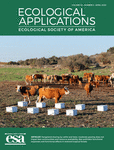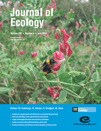
Ecological Complexity
Scope & Guideline
Innovating ecological modeling for a sustainable future.
Introduction
Aims and Scopes
- Ecological Modeling and Simulation:
The journal emphasizes the development and application of mathematical and computational models to simulate ecological phenomena. This includes individual-based models, agent-based models, and dynamical systems modeling that help predict species interactions and ecosystem dynamics. - Interdisciplinary Approaches:
Research published in the journal often integrates concepts from ecology, biology, mathematics, and social sciences. This interdisciplinary focus allows for a more holistic understanding of complex ecological systems and their responses to environmental change. - Network Theory in Ecology:
A significant aspect of the journal's scope is the application of network theory to ecological interactions, such as predator-prey dynamics, species dispersal, and ecosystem services. This approach aids in understanding the connectivity and resilience of ecological networks. - Impact of Environmental Change:
The journal explores the effects of climate change, habitat fragmentation, and anthropogenic influences on ecological systems. Studies often assess the resilience and adaptability of ecosystems in the face of such changes. - Complexity and Biocomplexity:
Theoretical discussions on the nature of complexity in ecological systems are a core area of interest, with papers exploring the philosophical and historical aspects of ecological complexity and its implications for conservation and management.
Trending and Emerging
- Climate Change and Ecosystem Responses:
An increasing number of studies are focusing on how climate change impacts species distributions, ecosystem services, and overall ecological resilience. This theme is crucial as it helps in developing strategies for conservation and management in a rapidly changing environment. - Agent-Based and Individual-Based Modeling:
There is a growing trend in using agent-based and individual-based models to simulate ecological interactions and behaviors. These models provide insights into how individual behaviors can affect population dynamics and ecosystem processes, highlighting the importance of fine-scale interactions. - Social-Ecological Systems:
Research on the integration of social and ecological systems is gaining traction. This trend reflects the recognition that human activities and ecological processes are interconnected, necessitating an integrated approach to understanding and managing ecosystems. - Network Dynamics in Ecosystems:
Emerging studies are increasingly applying network theory to analyze complex interactions among species and their environments. This approach helps elucidate the implications of connectivity and interaction patterns for ecosystem stability and resilience. - Eco-Epidemiology and Disease Dynamics:
The intersection of ecology and epidemiology is becoming a significant area of focus, particularly in the context of wildlife diseases and their impacts on populations and ecosystems. Understanding these dynamics is crucial for effective wildlife management and conservation strategies.
Declining or Waning
- Traditional Species-Centric Studies:
There is a noticeable decline in studies focusing solely on single species interactions without considering broader ecological contexts. As the field moves toward more integrative approaches, research that does not incorporate multi-species interactions or ecosystem-level analyses is becoming less frequent. - Static Ecological Models:
Static models that do not account for dynamic changes in ecosystems or the influence of external variables are being phased out in favor of more dynamic and adaptable modeling approaches. The trend is shifting towards models that incorporate temporal and spatial variability. - Descriptive Studies Without Quantitative Analysis:
There has been a reduction in purely descriptive ecological research that lacks quantitative or computational analysis. The journal now favors studies that provide rigorous quantitative assessments, which are essential for robust ecological insights. - Localized Case Studies:
Research that focuses exclusively on localized ecological phenomena without considering broader implications or connections to global ecological processes is becoming less common. The journal is increasingly prioritizing studies that offer insights into larger ecological networks and interactions.
Similar Journals

Food Webs
Exploring the intricate connections of ecological dynamics.Food Webs is a peer-reviewed journal published by Elsevier, dedicated to advancing the understanding of ecological dynamics through the study of food webs. With an ISSN of 2352-2496, this journal provides a platform for novel research that bridges the fields of ecology, evolution, behavior, and systematics. The journal's impact in the academic community is reflected in its 2023 Q2 ranking in both Ecology and Ecology, Evolution, Behavior and Systematics, showcasing its relevance and influence across these interconnected fields. Although it does not offer open access, it remains accessible to a wide audience of researchers and professionals due to its affiliation with a reputable publisher. The Scopus rankings position Food Webs favorably, with significant placements in the ecologically relevant categories, thus highlighting its contribution to advancing our understanding of complex ecological relationships. With a commitment to evidence-based research and interdisciplinary collaboration, Food Webs aims to foster knowledge that informs both scientific understanding and practical conservation efforts.

ECOLOGICAL APPLICATIONS
Unveiling the complexities of ecological systems.ECOLOGICAL APPLICATIONS, published by WILEY, is a leading journal in the field of ecology, providing a platform for innovative research that addresses the understanding and management of ecological systems. With an ISSN of 1051-0761 and E-ISSN of 1939-5582, it has established itself as a vital resource for ecologists and environmental scientists since its inception in 1991. Ranked in the top quartile (Q1) for Ecology in 2023 and with a Scopus ranking of 40 out of 461 in Environmental Science, ECOLOGICAL APPLICATIONS boasts an impressive impact factor, attesting to its significance and influence in the field. The journal's mission is to publish peer-reviewed articles that contribute to ecological theory and its applications in conservation and environmental management. Researchers, professionals, and students alike will find invaluable insights and the latest developments in ecological research through its comprehensive scope and rigorous scholarship, ensuring a crucial role in shaping future ecological practices and policies.

JOURNAL OF ECOLOGY
Exploring the intricate web of life and its processes.JOURNAL OF ECOLOGY, published by Wiley, stands as a leading publication in the field of ecology, evolution, behavior, and plant science, currently positioned in the prestigious Q1 quartile across these categories. Established in 1976, the journal has consistently provided a platform for innovative research and critical discourse related to ecological patterns, processes, and interactions. With its robust Scopus ranking—31st out of 721 in Ecology, Evolution, Behavior and Systematics, and 26th out of 516 in Plant Science—this journal notably reflects the high impact and influence of its articles in the scientific community. Although it does not offer open access options, the journal ensures comprehensive dissemination of pivotal findings to researchers, professionals, and students alike. Located in the United Kingdom at 111 River St, Hoboken, NJ, the JOURNAL OF ECOLOGY remains an essential resource for those dedicated to advancing our understanding of ecological systems and their complexities.

OECOLOGIA
Advancing Ecological Insights for a Sustainable FutureOECOLOGIA is a prestigious journal dedicated to the interdisciplinary fields of ecology, evolution, behavior, and systematics, published by Springer. Established in 1968, this journal has consistently contributed to the scientific community, maintaining a strong impact factor reflected in its Q1 ranking within its category for 2023, and an impressive 79th percentile among 721 journals in the Scopus rank for Agricultural and Biological Sciences. With a commitment to advancing ecological knowledge and fostering innovative research, OECOLOGIA serves as a vital platform for researchers, professionals, and students exploring complex ecological dynamics and evolutionary processes. Although it does not offer open access, the journal remains dedicated to high-quality, peer-reviewed publications that inspire and inform the next generation of ecological science. For those interested in the latest trends and significant findings in biology and ecology, OECOLOGIA is an essential resource that continues to shape the discourse and understanding in these critical fields.

ECOGRAPHY
Transforming Ecological Knowledge into ActionECOGRAPHY, published by WILEY, stands at the forefront of ecological and evolutionary research, with an impressive Impact Factor reflecting its esteemed position in the Q1 category of Ecology, Evolution, Behavior, and Systematics. Operating since 1978 and transitioning to a fully Open Access model in 2020, the journal is dedicated to disseminating high-quality research that influences conservation practices and enhances our understanding of ecological dynamics. With an ISSN of 0906-7590 and an E-ISSN of 1600-0587, ECOGRAPHY has garnered a remarkable placement in Scopus rankings, being in the top 4% of its category, achieving an impressive rank of #27 out of 721 in Agricultural and Biological Sciences. Academics from around the globe benefit from the research published in this journal, which seeks to engage and inspire further exploration of ecological systems. For inquiries, ECOGRAPHY can be reached at their UK address: 111 River St, Hoboken 07030-5774, NJ.

OIKOS
Unveiling the complexities of ecology and evolutionary science.OIKOS is a leading journal dedicated to the field of Ecology, Evolution, Behavior, and Systematics, published by WILEY in the United Kingdom. Since its inception in 1973, OIKOS has established itself as a vital platform for researchers seeking to advance their understanding of ecological interactions and evolutionary processes, with its impact reflected in its prestigious Q1 classification in the 2023 Scopus rankings. The journal's dedication to high-quality research is exemplified by its robust ranking of #106 out of 721 in the relevant categories, situating it within the top 15% of journals globally. With a commitment to disseminating influential findings, OIKOS encourages the open exchange of ideas among a diverse range of scholars, making it an essential resource for academics, professionals, and students alike. Whether you are interested in innovative ecological theories or applied research with real-world implications, OIKOS provides a rich repository of knowledge to inform and inspire your work.

Frontiers in Ecology and Evolution
Empowering discovery in the realms of ecology and evolutionary biology.Frontiers in Ecology and Evolution, published by FRONTIERS MEDIA SA, stands as a premier open-access journal dedicated to the exploration and discourse in the interdisciplinary fields of ecology and evolutionary biology. With its inception in 2013, this journal has rapidly ascended to a prestigious position, securing a Q1 ranking in both Ecology and Ecology, Evolution, Behavior and Systematics categories, reflecting its influential impact in the respective fields. Operative from Switzerland, Frontiers in Ecology and Evolution enables researchers, professionals, and students to access high-quality research without barriers, promoting collaboration and innovation. The journal covers a broad range of topics, from ecological dynamics to evolutionary strategies, facilitating profound insights that drive scientific advancement and understanding. With a remarkable position in Scopus rankings—ranking #218 in Ecology, Evolution, Behavior and Systematics and #145 in Environmental Science—this journal is essential for anyone keen on contributing to or staying updated with contemporary research in ecology and evolution.

Annual Review of Ecology Evolution and Systematics
Synthesizing Knowledge for a Sustainable FutureThe Annual Review of Ecology, Evolution, and Systematics, published by Annual Reviews, is a leading academic journal dedicated to advancing the understanding of ecological and evolutionary processes. With a commendable impact factor and impressive rankings—9th in both the Ecology, Evolution, Behavior and Systematics category and the Environmental Science category—this journal is recognized for its rigorous peer-reviewed articles that synthesize research findings across a wide range of topics within the fields of ecology and evolutionary biology. Established in 2003, this annual publication aims to provide researchers, professionals, and students with comprehensive insights into the latest developments and trends within these dynamic disciplines. By facilitating access to high-quality scholarly articles, the Annual Review of Ecology, Evolution, and Systematics continues to play a crucial role in fostering scientific discourse and discovery.

FOLIA GEOBOTANICA
Exploring the intricate connections between flora and fossil.FOLIA GEOBOTANICA, published by Springer, is a distinguished journal dedicated to advancing the fields of Paleontology and Plant Science through the dissemination of high-quality research. With an ISSN of 1211-9520 and an E-ISSN of 1874-9348, this journal has been pivotal in providing a platform for innovative studies from 1994 to 2024. Notably, FOLIA GEOBOTANICA holds a Q3 ranking in Paleontology and a Q2 ranking in Plant Science as of 2023, affirming its relevance and contribution to the scholarly community. The journal is located in the Netherlands at VAN GODEWIJCKSTRAAT 30, 3311 GZ DORDRECHT, and is not an Open Access publication, ensuring comprehensive review processes and scholarly integrity. With Scopus rankings that place it in the 50th percentile for Plant Science and 46th for Paleontology, FOLIA GEOBOTANICA continues to attract researchers, professionals, and students who are keen to explore the intricacies of plant ecology and fossil records, thereby fostering a deeper understanding of ecological and evolutionary patterns.

RUSSIAN JOURNAL OF ECOLOGY
Exploring the Rich Tapestry of Russia's Ecological LandscapeRUSSIAN JOURNAL OF ECOLOGY, published by PLEIADES PUBLISHING INC, stands as a critical resource within the field of ecology, offering an array of research insights that span various ecological topics. With an ISSN of 1067-4136 and an E-ISSN of 1608-3334, this journal has been consistently disseminating knowledge since its inception in 1996, now converging towards 2024. Despite its current Q4 ranking in the Ecology, Evolution, Behavior and Systematics category, the journal has carved out a niche in the publication landscape, particularly for scholars focused on the rich and diverse ecological phenomena of Russia and surrounding territories. The journal aims to foster interdisciplinary collaboration and innovation by providing a platform for the dissemination of high-quality research. While it currently lacks open access options, readers can expect in-depth studies and analytical discourses that contribute meaningfully to the global understanding of ecological systems. With an impressive Scopus rank, this journal remains an important outlet for researchers, professionals, and students committed to advancing ecological science.